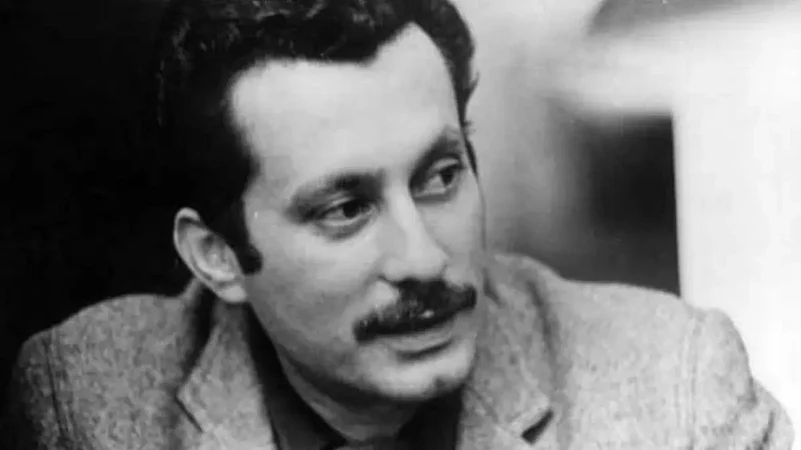“You and me and all the kids our age didn’t understand what was going on. But that night we started to gather the threads of the story.”
– Ghassan Kanafani, The Land Of Sad Oranges
A political leader, activist, journalist, essayist, literary innovator – these are some words used to describe Ghassan Kanafani, a preeminent Palestinian novelist who mastered the telling of the lived memories of thousands of Palestinians fighting the generations-old war to claim their land.
Born as Ghassan Fayiz Kanafani in Acre (Akka) in 1936 during the British rule of Palestine, he was the third of eight children of Muhammad Fayiz Abd al Razzag, a lawyer who was active in the movement opposing the British occupation and its encouragement of Jewish immigration. As a young boy, he went to one of the most prominent French schools, College des Freres, in Yafa (now Jaffa). However, when the hostilities of the 1948 Arab-Israel War hit Acre, Ghaffan, 12, and his family were forced into exile like 700,000 other Palestinians who became part of the exodus.
Kanafani and his family first took refuge in neighbouring Lebanon, from where they moved and settled in Damascus, Syria. Kanafani’s family survived with his father’s small lawyer practice supplemented by the boys’ part-time work, while Kanafani completed his secondary education there. While in Damascus, Kanafani also joined the printing press to support his family, which perhaps acted as an inspiration for his career as a writer.
Years later, he shared memories of his childhood trauma in his short essay ‘The Land of Sad Oranges’. He wrote about the fear and anxiety when his family was forced to flee his homeland. Here are a few lines:
“The sky was cloudy, a touch of cold air chilled my body. Riad sat calmly with his legs propped on top of the box, his back resting against the furniture, staring at the sky. I was sitting in silence, holding my knees by my arms and putting my chin between my legs…All along the way there were orange groves. A sense of fear and anxiety spread over everyone. The car moved with difficulty over the wet soil, and from a distance, we heard the sound of gunshots as if bidding us farewell.”
Kanafani's words resonate even 52 years after his death, with the current harrowing visuals of civilians in Gaza fleeing their homes after “evacuation” orders by Israel.
Among his other celebrated works are Men in the Sun (1962), All That's Left to You (1966), Umm Sa’ad (1969), and Return to Haifa (1970). He pioneered the ‘resistance’ literature of Palestinians and painted a picture of how their hopes for a future remain locked in the war with Israel.
His books have been translated into many languages and published in over 20 countries. The Conference of Afro-Asian Writers posthumously awarded him the Lotus Prize for Literature.
Kanafani’s Political Journey
In 1952, Kanafani took admission at the University of Damascus to study Arabic Literature. There, he met Palestinian revolutionary George Habash, who introduced him to politics. Habash and Kanafani had similar childhoods; the former had to flee his homeland, Lydd (Lod). Habash had a significant impact on Kanafani’s thoughts and convinced him to start writing for Al-Rai (The Opinion) newspaper.
During that time, Kanafani also received a teaching certificate from the United Nations Relief and Works Agency for Palestine Refugees (UNRWA). He was employed as an art teacher for 1,200 displaced Palestinian children in a refugee camp. There, he also began writing short stories.
In 1967, Habash founded the Popular Front for the Liberation of Palestine (PFLP), a revolutionary organisation which usually took a hard line on Palestinian rights and liberation. Kanafani served as the spokesman of PFLP and the editor of its weekly, Al-Hadaf.
Meanwhile, Kanafani moved to Beirut in 1960, where he met his wife and Danish activist Anni Hover. She was in the Middle East to learn about Palestinian struggle. The couple married in 1961 and had two children - a son named Fayez and a daughter named Laila.
Assassination
By late 60s, Kanafani became a well-known intellectual and activist and a leader of the PFLP. Meanwhile, PFLP’s military wing was known to target Israeli interests with bombing attempts and guerilla operations.
On May 30, 1972, there was a terrorist attack on Lod airport (near present-day Tel Aviv) that killed 26 people and injured 80 others. Three members of the Japanese Red Army had collaborated with the external operations wing of PFLP to open fire at the airport. Though Kanafani’s involvement in the attack is unknown, he was a vocal advocate for the Palestinian liberation war against Israel. In an interview in Beirut in 1970, Ghassan Kanafani voiced his opposition to peace talks with Israel, comparing it to “a conversation between the sword and the neck”.
“It is not a civil war but people defending themselves against a Fascist government…it is not a conflict, it is a liberation war fighting for justice,” he said in the interview, correcting the reporter.
However, Kanafani became a target for the Israeli government for his alleged involvement in the Lod attack.
On July 8, 1972, 36-year-old Kanafani sat in his Austin 1100 with his 17-year-old niece Lamees Najim. As he turned on the ignition, he triggered a grenade, which in turn detonated three kilos of plastic bombs planted in the car, killing both of them. Later, Mossad - the Israeli foreign intelligence service - claimed responsibility, citing it was in response to the Lod airport massacre.
Kanafani is remembered through his extensive literary work that continues to inspire many Arabic writers and literary people across the world. His legacy lives on and continues to pulse for the Palestinian cause half a century after his death.






















